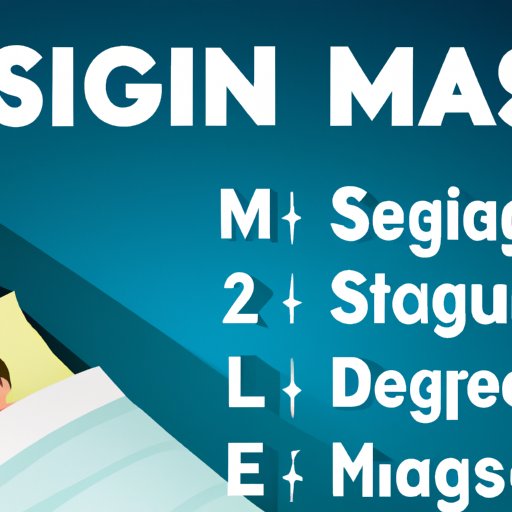Introduction
Magnesium is an essential mineral that plays an important role in a variety of bodily functions—including the regulation of sleep. Studies have shown that magnesium can help improve sleep quality and duration, as well as reduce stress levels and anxiety. With so many different types of magnesium supplements available, it can be difficult to know which one is best for sleep. In this article, we will explore the pros and cons of various magnesium supplements and provide tips on how to choose the right one for a good night’s rest.

A Comprehensive Guide to Evaluating Which Magnesium Supplement is Best for Sleep
Before we dive into the specifics of each type of magnesium supplement, let’s take a look at the science behind magnesium and sleep. Research has shown that magnesium helps to regulate the body’s circadian rhythm, or internal clock, which is responsible for controlling when we feel sleepy and wake up. Additionally, magnesium helps to relax the muscles and nerves, allowing us to fall asleep more quickly and stay asleep longer. It also helps to reduce stress levels and anxiety, which can interfere with sleep.
Now that we have a better understanding of how magnesium affects sleep, let’s take a look at the pros and cons of different types of magnesium supplements. Different forms of magnesium vary in terms of absorption rate, bioavailability, and side effects. Some types of magnesium are better absorbed than others, while some may cause gastrointestinal discomfort or other side effects. It is important to consider these factors when selecting a magnesium supplement.
How to Choose the Right Magnesium Supplement for a Good Night’s Rest
When choosing a magnesium supplement, it is important to identify your specific needs. Consider your lifestyle, dietary habits, and any medical conditions that may influence your choice. Additionally, it is important to factor in the cost of the supplement, as well as its potential side effects. Once you have identified your needs, you can begin to evaluate the different types of magnesium supplements on the market.

An Overview of the Most Popular Magnesium Supplements for Sleep
There are several different forms of magnesium supplements available, including magnesium oxide, citrate, glycinate, and taurate. Each type has its own unique benefits and drawbacks.
Magnesium Oxide
Magnesium oxide is one of the most common forms of magnesium supplements. It is inexpensive and widely available, making it a popular choice. However, it is not easily absorbed by the body, and can cause digestive discomfort. Additionally, it has a laxative effect, which can be beneficial for those experiencing constipation.
Magnesium Citrate
Magnesium citrate is another popular form of magnesium supplements. It is easily absorbed by the body, but can cause digestive discomfort. Additionally, it can have a laxative effect, which can be beneficial for those experiencing constipation.
Magnesium Glycinate
Magnesium glycinate is a chelated form of magnesium, meaning it is bound to an amino acid for better absorption. It is well-tolerated by the body and does not cause digestive discomfort. Additionally, it has been shown to help improve sleep quality and reduce stress levels.
Magnesium Taurate
Magnesium taurate is a combination of magnesium and taurine, an amino acid. It is well-absorbed by the body and does not cause digestive discomfort. Additionally, it has been shown to help improve sleep quality and reduce stress levels.
A Comparison of Magnesium Supplements and Their Effects on Sleep Quality
Now that we have an overview of the different types of magnesium supplements, let’s compare their effects on sleep quality. According to a study published in the Journal of Orthomolecular Medicine, magnesium oxide was found to increase sleep latency, or the amount of time it takes to fall asleep. Magnesium citrate was found to improve sleep quality and reduce stress levels, while magnesium glycinate was found to decrease sleep latency and improve overall sleep quality. Finally, magnesium taurate was found to improve sleep quality and reduce stress levels without any adverse side effects.
Conclusion
In conclusion, magnesium is an essential mineral that plays an important role in regulating sleep. Different types of magnesium supplements vary in terms of absorption rate, bioavailability, and potential side effects. When selecting a magnesium supplement, it is important to consider your specific needs, as well as the cost and potential side effects of the supplement. Each type of magnesium supplement has its own unique benefits and drawbacks, and research has shown that they all have the potential to improve sleep quality and reduce stress levels. As always, it is important to consult with a doctor or healthcare professional before taking any new supplement.
When it comes to improving sleep quality, magnesium is one of the most effective natural remedies. With so many different types of magnesium supplements available, it can be difficult to know which one is best for sleep. This article provided a comprehensive guide to evaluating which magnesium supplement is best for sleep, as well as tips on how to choose the right one for a good night’s rest.
(Note: Is this article not meeting your expectations? Do you have knowledge or insights to share? Unlock new opportunities and expand your reach by joining our authors team. Click Registration to join us and share your expertise with our readers.)
